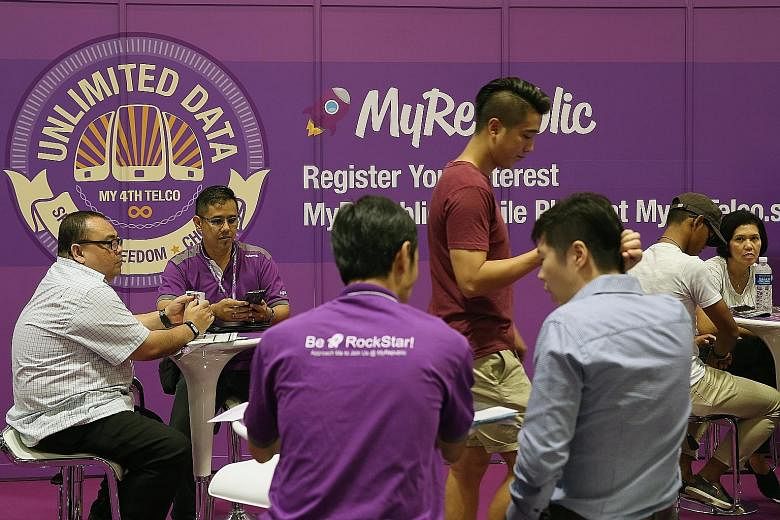Analysts are split over which of the two likely contenders for Singapore's fourth telco licence will prevail.
In one corner is fibre broadband service provider MyRepublic, with a unit of Consistel, which set up the Singapore SportsHub's wireless systems, in the other.
The Infocomm Development Authority (IDA) said last year that it will hold a mobile airwave auction in the third quarter of this year.
The eventual winner, which will become the fourth telco after Singtel, StarHub and M1, could be rolling out its services as early as April next year.
In a report yesterday, DBS analyst Sachin Mittal said MyRepublic has "much better chances" than Consistel. "We see returns on investment of less than 10 per cent for Consistel versus a possible 25 per cent returns on investment for MyRepublic," he wrote.
He noted that Consistel was not part of IDA's two-month trial last year of HetNet, or heterogeneous network, in Jurong Lake District.
HetNet is a new wireless system that allows mobile phone users to hop across 3G, 4G or Wi-Fi networks, regardless of the operators, during disruptions or when surfing is slow on one network.
MyRepublic was given a provisional licence to take part in the trial alongside the three existing telcos. "Consistel has no experience with the network, which is a key focus area for Singapore's Smart Nation project," said Mr Mittal.
"This will put it in quite an unfavourable competitive position."
But research analysts from Nomura felt that MyRepublic may decide to walk away from the local bidding process and instead focus on the fixed-line and national broadband network opportunities in the region, which have decent potential.
The details of the auction process are not clear yet.
IDA said the starting price for the licences is $35 million - for various bands - and each contender will have to deposit a minimum of $20 million or 5 per cent of the budget earmarked for capital expenditure.
Nomura noted that both companies have revealed cost figures that are quite different.
Consistel plans to spend up to $1 billion for nationwide network coverage, while MyRepublic is targeting $250 million to $400 million to complement its existing fixed base and looking to break even with just under 10 per cent market share.
"It is hard to know which number is right, and the fact that existing telcos spend around $100 million to $1 billion in annual capex (capital expenditure) does not simplify the equation either," said Nomura.
"We do not think any new network build will be easy, or economical any time soon. Maybe we are relying too much on the legacy mindset still, but we have not really come across too many new entrants making it work either - we will continue assessing this."


